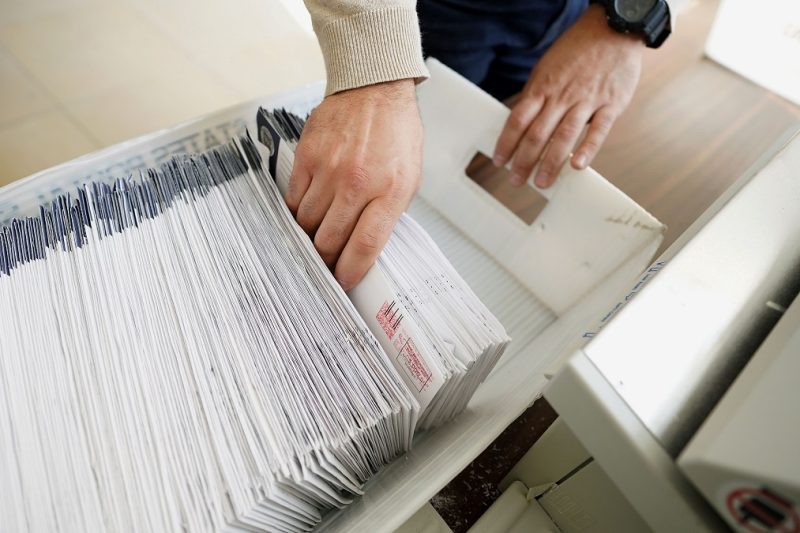The ruling by Commonwealth Court comes in response to suits filed by a Bradford County commissioner and group of Republican state representatives.
Angela Couloumbis of Spotlight PA
Spotlight PA is an independent, nonpartisan newsroom powered by The Philadelphia Inquirer in partnership with PennLive/The Patriot-News, TribLIVE/Pittsburgh Tribune-Review, and WITF Public Media. Sign up for our free newsletters.
HARRISBURG — An appellate court ruled Friday that Pennsylvania’s mail voting law — passed in 2019 with bipartisan support — is unconstitutional, but it will remain in place as Gov. Tom Wolf’s administration pursues an appeal to the state Supreme Court.
The ruling by Commonwealth Court comes in response to suits filed by Bradford County Commissioner Doug McLinko and a group of Republican state representatives — many of whom voted for Act 77, the law that expanded no-excuse mail voting in Pennsylvania.
In a 3-2 decision along party lines, the Republican judges — citing extensively from past state Supreme Court rulings — said such a change would need to be made through an amendment to the Pennsylvania Constitution, a lengthy process that would ultimately put the matter before voters.
The high-stakes ruling now moves to the state Supreme Court, which is dominated by Democrats. But Bruce Ledewitz, a Duquesne University professor and a state constitutional expert, said if the high court takes the case, “it will be a close legal question.”
Though voting rights advocates excoriated the Commonwealth Court decision Friday, Ledewitz said both sides have raised valid legal arguments, and he doesn’t expect the high court, if it accepts the case, to rule along party lines.
“Generally speaking, the Supreme Court has voted in favor of expanding access,” Ledewitz said. “If I had to bet, which I don’t, I would bet that they reverse. But … It’s going to be a close matter.”
The president of the Senate, Jake Corman (R., Centre), praised the Commonwealth Court’s decision, saying he had “no confidence” in mail ballots. In 2019, after helping pass the law, he hailed it as “the most significant modernization of our elections code in decades.”
Democratic Gov. Tom Wolf cast the GOP-led lawsuit as an effort “to strip away mail-in voting in the service of the `big lie.’”
“The strength of our democracy and our country depends on eligible voters casting their ballot and selecting their leaders,” Wolf said. “We need leaders to support removing more barriers to voting, not trying to silence the people.”
The state’s mail voting law, which passed the legislature with overwhelming bipartisan support, came under attack in the months before and after the 2020 presidential election. State Republicans at the time challenged what they saw as theWolf administration pushing the limits of the law amidst uncertainty over how to best keep voters safe as the pandemic raged.
In the lead-up to the November election, former President Donald Trump falsely said mail ballots were “fraudulent in many cases.” As it became apparent he would lose Pennsylvania, he claimed without evidence the election was being stolen from him as more mail ballots were counted.
Democrats have countered that GOP attempts to undermine the law are part of a national playbook to cast doubt on Trump’s defeat by President Joe Biden. They believe it is part of an orchestrated campaign to use the legal system to sow unwarranted suspicion over election integrity and thus limit voter access, which would disproportionately affect voters of color.
In a statement Friday shortly after the ruling became public, Trump praised the decision: “Big news out of Pennsylvania, great patriotic spirit is developing at a level that nobody thought possible. Make America Great Again!”
In making its determination, the panel of Commonwealth Court judges said that the state constitution requires voters to appear at polling places on Election Day, unless they have “duties, occupation, or business” that allows them to use absentee voting. The judges, in support of their reasoning, noted that the constitution has been amended several times to specify the exact groups of people who would qualify for absentee voting.
No excuse mail voting, the court said, is not explicitly spelled out in the constitution, and thus would require a constitutional amendment to be lawful. Constitutional amendments, unlike traditional bills, must follow a lengthy process: They first must be approved by the legislature in two consecutive sessions and then appear on the ballot for voters to have the final say.
“No-excuse mail-in voting makes the exercise of the franchise more convenient and has been used four times in the history of Pennsylvania. Approximately 1.38 million voters have expressed their interest in voting by mail permanently,” the decision, authored by Judge Mary Hannah Leavitt, states.
“If presented to the people, a constitutional amendment to end the … requirement of in-person voting is likely to be adopted,” Leavitt continued. “But a constitutional amendment must be presented to the people and adopted into our fundamental law before legislation authorizing no-excuse mail-in voting can ‘be placed upon our statute books.’”
Marian Schneider — senior voting rights policy counsel for the ACLU of Pennsylvania, which supported the original mail voting law — said the analysis was flawed.
“The state constitution requires that absentee voting be available to voters with disabilities, those who will not be in their precinct on Election Day for business reasons, for religious purposes, and for people deployed in the military,” Schneider said in a statement. “To read that language to mean that absentee voting is, therefore, forbidden for all other voters is a serious misreading of the constitution.”
WHILE YOU’RE HERE… If you learned something from this story, pay it forward and become a member of Spotlight PA so someone else can in the future at spotlightpa.org/donate. Spotlight PA is funded by foundationsand readers like you who are committed to accountability journalism that gets results.
